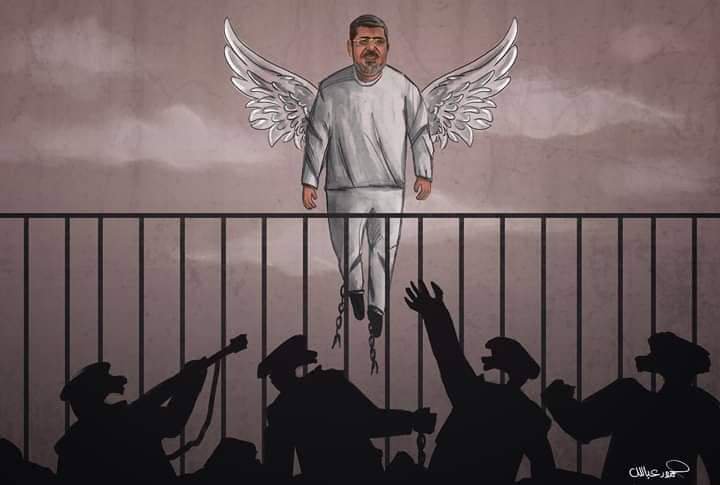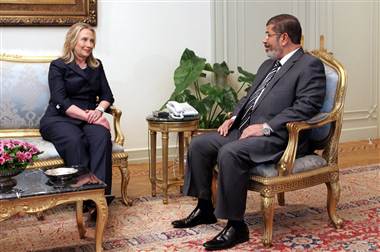Mohamed Morsi’s ghost will haunt Egypt for a long time
By Khaled Diab
The death in court of Mohamed Morsi completed the incarcerated former Egyptian president's unlikely metamorphosis from mediocre mundanity to mythical martyr whose political ghost will inspire generations of radical Islamists.
Wednesday 26 June 2019

Mohamed Morsi, the largely unknown and uncharismatic engineer and one-time professor at Cal State University who was jokingly referred to as the “spare tyre” when his party rolled him out of the closet to run for president in 2012, has gone from a backroom Muslim Brotherhood apparatchik to a widely sung symbol of the Islamist cause following his death in court.
And the creators of this tragic icon – who will almost certainly inspire generations of disgruntled Islamists – are none other than Egypt's men in khaki. By ousting, arresting, putting on show trial and criminally neglecting until his death the man whose presidency lasted just 12 months, the Egyptian military, led by current president Abdel-Fattah al-Sisi, made a hero out of a villain, transforming a hugely unpopular leader into the stuff of legend.
Morsi died on Monday 17 June, but his anointment as an immortal martyr of the cause has already begun, with his wife and other prominent Muslim Brotherhood members describing his death as martyrdom. Social media was awash with posts from pro-Morsi supporters eulogising the deposed president, including an image of the dead leader with angel wings ascending to the heavens. An Arabic hashtag describing Morsi as the martyr of the Islamic nation was popular on Twitter.
With Muslim Brotherhood sympathisers prohibited from organising a public funeral in Egypt, exiled members living in Turkey took to the streets to express their grief, chanting “Murderer Sisi, martyr Morsi,” with some holding up banners vowing that “putschists will be defeated”.
Islamists and conservatives from across the Muslim world have been paying tribute to his courage and defiance, describing him in terms normally reserved for saints. “History will never forget those tyrants who led to his death by putting him in jail and threatening him with execution,” said Turkish president Recep Tayyip Erdoğan, a man who knows a thing or two about being a tyrant, putting opponents behind bars, including thousands in solitary confinement, and pushing to reinstate the death penalty. “May God rest… our martyr's soul in peace.”
Morsi's perceived martyrdom was wholly unnecessary and entirely avoidable. The Muslim Brother was, indeed, the first president in Egypt's history to be elected in a multicandidate electoral race, but his ineptitude and divisive politics quickly made him incredibly unpopular, even among former supporters.
At the time, many Egyptians I encountered who had voted for him were disappointed that Morsi's piety had not translated into compassion for his compatriots, let alone competence – that he was an incompetent version of Mubarak but with a beard. Like his predecessor, he also intimidated and locked up critics, and employed violence against protesters.
Morsi's authoritarian tendencies and ambitions were on full display in November 2012 when he granted himself dictatorial powers, prompting angry protests which forced him to backpedal. Rather than being a conciliatory transitional leader, Morsi was deeply partisan and his top priority was to Islamise to the max the draft constitution and to place Brotherhood loyalists in positions of influence and power.

But it was not just about Morsi's malice. For a party that had been preparing to govern for decades, the Muslim Brotherhood's breathtaking incompetence in power confounded most Egyptians. One ironic example of this legendary ineptitude was when a confidential, leak-proof meeting to discuss options for dealing with Ethiopia's plans to build a dam on the Nile was being broadcast live on television.
The popular discontent with Morsi and his Brotherhood prompted waves of popular protest, culminating in a mass uprising on June 30, 2013.
Had the military stayed out and left matters to run their course, the mass mobilisation on the streets may have eventually forced Morsi to call early elections or led to his government's downfall. But General Abdel-Fattah al-Sisi, who is currently Egypt's president, had other plans… and ambitions.
Even after the undemocratic coup he engineered, Sisi could have navigated a more pragmatic and conciliatory path — after all, the Muslim Brotherhood was a spent force that had squandered in a few short months most of the popular goodwill it had carefully nurtured through decades of charity work and grassroots activities.

Instead, al-Sisi demanded a “mandate” to eradicate what he described as “terrorism,” perpetrating the bloodiest and cruellest massacre of civilians in Egypt's modern history, in which over 1,000 civilians were butchered by security forces. This pivotal moment convinced many in the Muslim Brotherhood that politics was not for them and reawakened the movement's paranoia and persecution complex.
The relentless repression since 2013 has radicalised some former members, propelling them towards more violent movements, and has helped the Brotherhood to regain some of the popular sympathy it has lost.
Rather than stamping out the terrorism the regime claims disingenuously to be fighting, Egypt is now faced with a full-blown insurgency in the Sinai and terrorist attacks on the mainland have become quite common place.
Like George W Bush's disastrous and self-serving War on Terror, this failure was all too easy to foresee. That Morsi's death after years of imprisonment and wanton neglect would prompt Muslim Brotherhood sympathisers to view Sisi as a murderer and “enemy of Islam” is also something that has been clear for some years now.
Beyond bleeding-heart humanists like myself, this terrifying possibility could have and should have been abundantly clear to the Egyptian regime. After all, it has been here before: In the 1950s and1960s, then-President Gamal Abdel-Nasser undertook a similar crackdown against the Muslim Brotherhood. In 1966, the Nasser regime took the fateful decision to execute a radical Muslim Brother by the name of Sayyid Qutb. Qutb was transformed overnight into a martyr who has inspired violent Islamists ever since, including Osama bin Laden, who was at first embraced by the United States because it shortsightedly wanted to use his zeal against the Soviets in Afghanistan, creating even greater blowback.
This raises the pertinent question of whether there is method in the madness, or only madness in the methods employed by the Sisi regime. Is the Egyptian leader a cunning Machiavellian political operator who, needing a threat sufficiently scary, first needed to create the monster he will spend years attempting to slay, even if it runs the risk of pushing his country over the abyss?
Far more likely is that he simply lacks the capacity to react in any other way. Unlike Mubarak, who despite being a military man spent years in politics before becoming president, Sisi has only ever known the army, with its inflexibility, hierarchy and obedience, and this has made him view the political arena as a literal, rather than a figurative, battlefield.

The silence from Washington will further inflame the false Islamist narrative which alleges that the coup against Morsi was a US-Zionist conspiracy against Islam. Of course, this flies against the evidence, as Morsi actually enjoyed good relations with Washington and continued Mubarak's policies toward the United States.
Judging by America's track record in the Middle East, its overriding concern is what Washington defines as its “vital interests”, and ideology plays a surprisingly marginal role. That explains why America has a decades-old special relationship with Saudi Arabia, the self-defined home of Islam, and the other conservative Arab Gulf states.
Nevertheless, Morsi's perceived martyrdom will lead radical Islamists to bend and twist reality to serve their ideological and political purposes. The conspiracy theories about the evil forces which emerged following Morsi's downfall will take on new life and ever more elaborate formats after his death, which will be juxtaposed against the angelic image of saintly virtue that has been constructed around the martyred leader, in whose memory and cause some of his followers will also wish to martyr themselves. And this is bad news for Egypt, the Middle East, America and the West.

